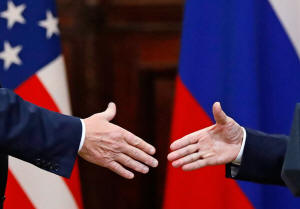Trump vowed to end the war in Ukraine quickly but Moscow and Kyiv are
digging in before any talks
 Send a link to a friend
Send a link to a friend
 [January 18, 2025] [January 18, 2025]
President-elect Donald Trump has pledged to broker a peace deal in
Ukraine, but as he prepares to take office, peace seems as elusive as
ever.
Moscow and Kyiv are seeking battlefield gains to strengthen their
negotiating positions ahead of any prospective talks to end the
3-year-old war.
In the past year, Russian troops have slowly but steadily advancing
through Ukrainian defenses, seeking to establish full control of the
four regions in the east and south that Moscow illegally annexed early
in the war but never completely captured. It's also launching waves of
missiles and drones to try to cripple Ukraine's energy network and other
vital infrastructure.
Ukraine, in turn, has tried to secure and extend its incursion into
Russia’s Kursk region. Kyiv's missiles and drones also have struck
Russian oil facilities and other key targets important for Moscow’s war
machine.
Both sides have taken tough negotiating postures that leave little room
for compromise.
Trump, who vowed during his campaign to settle the war in 24 hours,
changed that time frame earlier this month, voicing hope that peace
could be negotiated in six months. His nominee for envoy to Ukraine,
Keith Kellogg, says a deal could be brokered in 100 days.
The views from Moscow and Kyiv
Russian President Vladimir Putin has declared Moscow’s readiness for
talks but emphasized that any peace deal should respect the “realities
on the ground,” a not-so- subtle way of saying it must take into account
Russia's land gains.
He emphasized in June that Ukraine must also renounce its NATO bid and
fully withdraw its forces from Donetsk, Luhansk, Zaporizhzhia and
Kherson — the regions Russia annexed in September 2022 — demands that
Ukraine and the West have rejected. Moscow also wants the West to lift
its sanctions that has limited Moscow's access to global markets and
dealt a heavy blow to Russia's economy.
Massive military spending has bolstered Russian economic output that
grew by nearly 4% last year, but the weakening ruble and labor shortages
fueled high inflation and increasingly destabilized the economy. Last
week, President Joe Biden sharpened the pain for Moscow by expanding
sanctions on Russia’s vital energy sector, including its shadow shipping
fleet used to bypass earlier restrictions.
Ukrainian President Volodymyr Zelenskyy's initial “peace formula”
demanded Russia’s full withdrawal from all occupied territories, but he
later softened his position as Moscow continued to make gains, and he is
no longer making that retreat a condition for talks. Zelenskyy has faced
reluctance from some allies to offer Kyiv quick membership in NATO, but
he insists on strong security guarantees from the U.S. and other Western
partners as the key element of any prospective peace deal.

Zelenskyy has emphasized the need for a comprehensive agreement, not a
temporary halt to hostilities that would only allow Russia to replenish
its arsenal. He has pushed for the deployment of Western troops to
Ukraine as peacekeepers.
Putin has similarly rejected a temporary truce, pointing out that
Russian troops are pressing an offensive and any break in the fighting
would allow Ukraine to get reinforcements and supplies.
“The Russians are seeing that Trump is going to push for some kind of
resolution or some kind of settlement, and they want to grab as much as
they can,” said Kurt Volker, who served as special representative for
Ukraine in Trump's first term.
Ukraine's manpower shortages and a surprise attack
Russia controls about a fifth of Ukrainian territory, including the
Crimean Peninsula that was annexed illegally in 2014. It held the
battlefield initiative for most of 2024, pressing offensives in several
sections of the over 1,000-kilometer (600-mile) front line. Moscow’s
gains in the fall were the largest since the opening stage of the
invasion.
Ukraine has faced dire manpower shortages as it struggles to mobilize
enough recruits to compensate for its losses and increasing desertions.
Michael Kofman, a senior fellow with Carnegie Endowment, observed that
“stabilizing the front line is essential to buying time and forcing
Moscow to reassess.” He noted that Ukraine’s mobilization rates fell
considerably since summer and “manning levels continued to decline,
especially among infantry units holding the front lines.”
[to top of second column]
|

U.S. President Donald Trump shakes hands with Russian
President Vladimir Putin at the end of a news conference following
their meeting at the Presidential Palace in Helsinki, Finland, on
July 16, 2018. (AP Photo/Alexander Zemlianichenko, File)

Moscow-based military analyst Sergei Poletaev noted that even though
Russia lacks resources for a major breakthrough, it has refined the
tactic of small-scale, slow advances in multiple sectors.
“Moscow is betting on the physical exhaustion of the Ukrainian armed
forces and the Ukrainian state’s meltdown,” Poletaev wrote recently.
Kyiv sought to change its fortunes by launching an incursion into
Russia’s Kursk region in August, aiming to distract Moscow's forces
in eastern Ukraine and strengthen its hand in negotiations. Russia,
initially caught by surprise, intensified efforts to drive out the
Ukrainian forces. The U.S., Ukraine and South Korea said North Korea
sent 10,000- 12,000 troops to Russia to fight in the Kursk region.
How peace talks could evolve
Kellogg, the new administration's nominee for Ukraine envoy,
dismissed European fears that Trump could reduce support for Kyiv,
saying “he’s not trying to give something to Putin or to the
Russians, he’s actually trying to save Ukraine and save their
sovereignty.”

Volker predicted Trump would urge Putin to end hostilities and warn
him that he would sharply increase pressure on Moscow if the Russian
leader fails to heed the demand.
If Putin refuses to halt the fighting, Volker said Trump would “open
up the spigot” and allow Ukraine to borrow as much money as it wants
and buy whatever military equipment it wants while toughening
sanctions on Russian oil and gas sector.
“I think those things would be aimed at driving Putin to conclude,
‘OK, it’s time to stop,’” Volker said.
Other observers warn that Putin would be unlikely to compromise on
his war goals, particularly while Russian troops have the upper hand
in Ukraine, and the Russian economy has so far survived ongoing
Western sanctions.
While seeking to cement his gains and win Western guarantees that
Ukraine will never be invited to join NATO, Putin also wants Kyiv to
accept a set of language, education and cultural policies to ensure
its friendly policies toward Moscow.
“Putin has tied his war to achieving this and is unlikely to
retreat,” Tatyana Stanovaya of the Carnegie Russia and Eurasia
Center wrote in a commentary. “Instead, he will likely intensify
efforts.”
She added that Russia’s demand for Ukraine’s “demilitarization”
implies not only deep cuts in its armed forces but also seeks
Western guarantees it won't rearm its ally.
“Moscow views any military support for Ukraine as inherently
hostile,” she said.
Putin is unlikely to walk back his annexation of the four Ukrainian
regions, a seizure that already has been written into the Russian
constitution.
“Moscow believes that a recognition of Russia’s new borders by
Ukraine is necessary to preclude the basis for a military revanche,”
political analyst Vladimir Frolov said in a commentary.
Many Moscow analysts are skeptical of prospects for a peace deal,
noting the widely divergent positions on both sides. Some say a
failure in the talks could put Russia and the U.S. on the brink of a
direct conflict if Trump decides to ramp up military support for
Ukraine.
“They tend to think in the West that Putin will get scared and agree
to a ceasefire,” wrote Poletaev, the Moscow-based analyst. “Just the
opposite. Putin will likely opt for an escalation and fight fire
with fire."
___
Associated Press writer Danica Kirka in London contributed.
All contents © copyright 2025 Associated Press. All rights reserved
 |